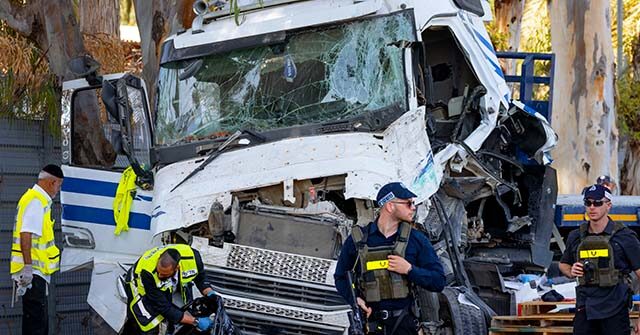On Sunday morning, a tragic terrorist attack unfolded in Israel when a truck driver plowed into a crowd waiting at a bus stop, resulting in one fatality and injuring at least 36 others, with six individuals reported to be in serious condition. The incident took place near Glilot, located north of Tel Aviv, marking yet another violent episode in a region grappling with ongoing security threats. Various sources, including Breitbart News and the Jewish News Syndicate, highlighted the severity of the attack, emphasizing its impact not only on the victims but also on the larger context of safety and stability in Israel.
Eyewitness accounts provide a harrowing perspective on the immediate aftermath of the attack. One witness, identified as Shuki Green, recounted the terrifying moments when the truck barreled through the crowd. Green, part of a group of retirees, described the panic as he and his companions realized the gravity of the situation. The bus they had just disembarked from managed to block part of the truck’s path, potentially preventing even greater devastation. As the chaotic scene unfolded, the perpetrator emerged from the vehicle armed with a knife, which escalated the sense of danger and urgency among those present.
In a swift act of intervention, the truck driver, later identified as Rammi Natur, an Arab citizen from Qalansawe, was fatally shot by armed bystanders. This incident underlines the critical role that civilian response can play during such violent attacks. Real-time actions taken by individuals in the vicinity not only prevented additional casualties but also demonstrated the complexities of safety measures in situations where law enforcement may not be immediately available. The prompt response of citizens possessing firearms further illustrates the contentious debate surrounding gun rights and self-defense in the region.
The attack drew widespread media attention, highlighting Israel’s ongoing struggle with security and terrorism. Discussions surrounding the implications of such attacks often extend beyond immediate violence, touching on the broader societal impacts, including heightened anxiety among the populace and calls for enhanced security measures. The integration of armed citizens into the security fabric of the nation raises pertinent questions about the balance between individual rights and public safety in the face of terrorist threats.
Authors and commentators like AWR Hawkins, an established figure in the dialogue surrounding Second Amendment rights and personal security, contribute further insight into the dynamics at play in incidents like this. With a background in military history and strong advocacy for individual self-defense, Hawkins offers a perspective that emphasizes the importance of preparedness and awareness among civilians. His involvement as a columnist and analyst reflects a growing discourse on how ordinary citizens can protect themselves and others in the unpredictable landscape of modern violence.
As the community grapples with the aftermath of this tragedy, the focus shifts towards healing and understanding the motivations behind such acts of terror. The need for discussion around systemic issues, security protocols, and community resilience becomes increasingly apparent. In the face of this violent episode, the response from both individuals and authorities will shape future security strategies and societal attitudes towards conflict and coexistence, ultimately influencing the fabric of Israeli society. The tragic events serve as a stark reminder of the challenges faced and the urgent need for comprehensive strategies that address the roots of violence while promoting peace and safety for all.

